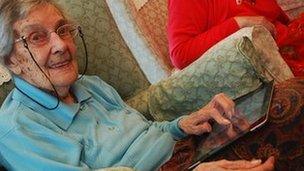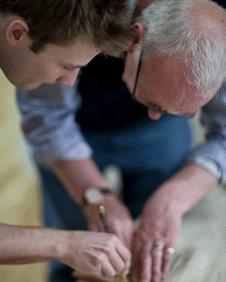Are the older generation getting tech-savvy?
- Published
Behind the scenes with the team at Cambridge Design Centre testing technology for older people
Anyone buying a tech gift for their older relatives this Christmas may live to regret it as they find themselves on 24-hour tech support for the rest of the year.
It is a flippant point and one bound to anger the horde of increasingly tech-savvy over-60s but it remains the case that older people are the ones most likely to be disengaged from technology.
It is something that Matthew Adam sees a lot.
"We hear all the time about how someone in the family has bought an older person a computer or an iPad and then aren't around to show them how to use it," he said
He runs Silver Training, a tutoring service aimed at older consumers. There are 31 tutors around the UK helping people with a range of tasks, from basic training in how to use a mouse and keyboard, to setting up email, sending attachments and saving documents.
Co-design
As the proportion of people aged 65 and over climbs to record highs in many countries, technology companies that fail to take account of the older consumer will be missing a trick, thinks Chris Millington.
He is the UK managing director for Doro, a Swedish telecoms firm that designs mobiles specifically for the older consumer.
It has just launched a smartphone which he hopes gets away from the image of an oversimplified handset.
"Just because a person is older doesn't mean they are all the same or that they just want a big-buttoned phone," he said.
"We know that while many just want ease of use and simplicity, most want a stylish and modern device with many more interested in features such as a camera, email and the internet too."
The main thing is not to assume knowledge, he said.
In a recent focus group conducted by Doro, 40 older consumers were challenged to add a contact to an Android handset - 38 failed to complete the task.
And iPhones are also ill-adapted to an older generation, says Mr Millington.

A lot of modern phones are not designed with older people in mind
"The average response time for the icons on the screen is 0.7 seconds but the average response time of someone aged 65 or over is one second. Every single touch activates the wobble, so Apple is excluding a whole audience."
Annika Small is chief executive of Nominet Trust, a charity that funds socially useful technology projects. She thinks industry needs to do more.
"We need to ensure that the technology sector places more emphasis on co-design, involving and engaging older people in the design of the services which they might want to use," she said.
Some argue that the next generation of older people will be more tech-savvy because they will have worked with technology but this won't eliminate the need for specially adapted devices, says Mr Millington.
"There are things that you can't change, such as eyesight, hearing, circulation and memory loss," he said.

One care home is using iPads to stimulate memory in its older residents
Combating loneliness
But persuading older people to use gadgets is only half the battle. Then they need to be persuaded to use the internet.
According to Ofcom, more than 7.5 million adults have never used the internet. Many of these are older - two-fifths are over 75.
For Ms Small the key lies in persuading older people about the human face of technology.
"It is critical that we find ways to motivate older people to get online by demonstrating how the internet can strengthen vital social ties that will help them to remain active and engaged," she said.
Crowd-sourced services are offering to do just that and heal one of the biggest threats facing older people - loneliness.
Casserole, for example, is a web service that promises to pair up people who like to cook with others in their area who might not always be able to cook for themselves. Funded by FutureGov, it is currently being run by councils in Surrey.
It also runs a secondary service, Pair Up, that supports regular meal-sharing. All of the diners currently in the scheme are over the age of 80.
Meanwhile The Amazings is a website keen to dispel the myth that the older generation need help.

The internet makes it easy to pass on skills
The site aims to put older people back at the centre of their communities and reignite the long-lost tradition that saw elders regarded as the most important members of a society.
It currently has more than 200 people on its books, from journalists to wood turners. Each offers a real-life class on their chosen skill, either as a one-off or as a course.
The most popular courses are those that feed into the current love of nostalgia. said spokesman Liam Fay-Fright.
"Knitting does well, so does crochet, curtain-making and anything that is about making do," he said.
Tapping into the knowledge of an older generation has huge potential for benefiting the whole of society, he thinks.
In return, perhaps we shouldn't begrudge our older relatives a little bit of tech support.
Anyone wanting to know more about the web can visit the BBC WebWise page
- Published25 October 2012
- Published14 June 2012
- Published4 September 2012